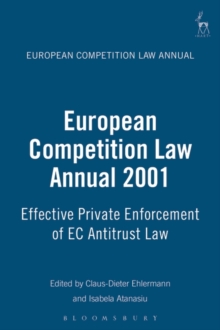
European Competition Law Annual 2013 : Effective and Legitimate Enforcement of Competition Law PDF
Edited by Philip Lowe, Mel Marquis, Professor Giorgio Monti
Part of the European Competition Law Annual series
Description
This volume contains papers presented at the 18th Annual EU Competition Law and Policy Workshop.
The papers examine means of balancing effective (public) competition law enforcement and the requirements of legitimate and accountable exercise of public authority.
The authors address the design and performance of various enforcement tools at European and national levels, including sanctions and remedies but also distinctive instruments under Regulation 1/2003 (eg commitment procedures) and under the Treaty on the Functioning of the European Union (Article 106(3) when used as a basis for infringement procedures).
From the perspective of legitimacy, reflections focus on the implications of fundamental rights standards and general principles of law for the EU's complex and quasi-federal enforcement architecture.
Issues that may sometimes escape judicial scrutiny are also discussed, such as how agencies prioritise their activities, and how investigation responsibilities are distributed within the European Competition Network.
Effectiveness and legitimacy are then considered in the context of public enforcement cooperation beyond the EU, where international organisations, regional cooperation and a range of formal and informal modes of governance prevail.
Information
-
Download - Immediately Available
- Format:PDF
- Pages:688 pages
- Publisher:Bloomsbury Publishing PLC
- Publication Date:21/04/2016
- Category:
- ISBN:9781509900473
Information
-
Download - Immediately Available
- Format:PDF
- Pages:688 pages
- Publisher:Bloomsbury Publishing PLC
- Publication Date:21/04/2016
- Category:
- ISBN:9781509900473










